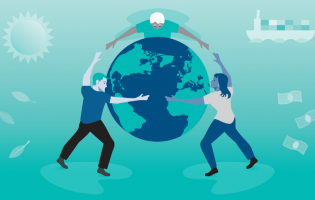Terrorism in the Transatlantic Context
On December 7, 2009, the American-German Institute (AGI) together with the Brandenburgisches Institut für Gesellschaft und Sicherheit (BIGS) held a conference on “Terrorism in the Transatlantic Context: Cultural and Economic Implications and Solutions.” The first and second panels analyzed the connection between culture and terrorism. The third panel examined the financing of terrorism, and the final panel looked at the economy as a cause of, target of, or solution to terrorist activities.
The first and second panels analyzed cultural implications of terrorism. After the attacks of September 11, Islam has begun to play a larger role in trying to explain terrorist attacks but still be viewed in a much more nuanced way. Islam is a faith and a cultural system, but not a political ideology; a differentiation between Islam and Islamism is needed. Islamists fight for the Islamization of Europe and the hearts and minds of Muslims in Europe. Within Islam, Islamists and moderate Muslims struggle about the right direction of the religion. While Germany and the U.S. have cooperated in counterterrorism policy, a different threat perception exists between the two countries. In fact, the German public sees Germany’s involvement in Afghanistan not so much as a needed counterterrorism strategy, but rather as a risk to the country’s security. Many other policy issues in Germany and the U.S., such as immigration, have been viewed through the terrorism angle as well, limiting smart policy options. Due to the international nature of the threat, the European Union has begun to establish itself more and more as a player in counterterrorism policy. The problem the West, and especially the U.S., is facing is how to support moderate Muslim groups around the world without dooming their work by associating them too closely with the U.S. and the West, in societies which are still rather anti-American. Yet, as there seems no alternative, the West should at least attempt the support of moderate Muslim groups. Additionally, it is important that the West defends its liberal democracy as its system of choice. By viewing terrorism as a criminal activity and trying terrorists in civilian courts, as the Obama administration has announced it will do, the West can give an example of an open and just society.
The third panel examined the financing of terrorist organizations and the organizations that terrorists can exploit in order to fill their coffers, as well as government responses and measures to deprive terrorists of their necessary funding. In counterterrorism, combating terrorist financing can best be used in conjunction with other counterterrorism tools and must be used both tactically and strategically. Governments often try a two-pronged strategy: (1) stemming the flow of funds by focusing on chokepoints, thereby restricting terrorists’ actions and (2) following the money, using financial intelligence to find and stop terrorists. This poses problems in that the money must be allowed to flow in order for governments to get useful intelligence. As can be seen from 9/11 and other attacks, terrorists do not require a lot of money but they do require access to it. Thus, charities are susceptible to abuse. While governments can and should promote charitable giving, charities also have a responsibility to do due diligence to ensure that they are not being used to channel funds to terrorist organizations. As charities have fallen under increased scrutiny, there is an increase in the use of crime to fund terrorism–although funding often comes from legal sources. The nature of financial transactions, be they via banks or through the informal network of hawala (Islamic banking), proves the need for greater cooperation among nations and between the public and private sectors on information sharing. Part of this will require determining how to integrate hawala banking into the existing international banking structure without imposing on it our own western regulations.
The final panel focused on the protection of critical infrastructure, as it pertains to the economic activity of countries. Germany, as many other countries, employs an all-hazard approach which includes terrorism as a hazard among other potential threats to critical infrastructure, such as natural disasters. As most of the critical infrastructure components are operated by private companies (e.g., electricity providers), a public-private partnership is thus essential and operators are responsible that measures are in effect. As critical infrastructure and attacks against it (e.g., cyber security) has begun to transcend national borders, international cooperation is important. Especially within the EU, such cooperation could be improved. In the U.S. cooperation within the government under the Department of Homeland Security (DHS) has been enhanced. However, the public-private partnership needs to be expanded. Transatlantic cooperation plays a great role in securing critical infrastructure through increased data sharing.






